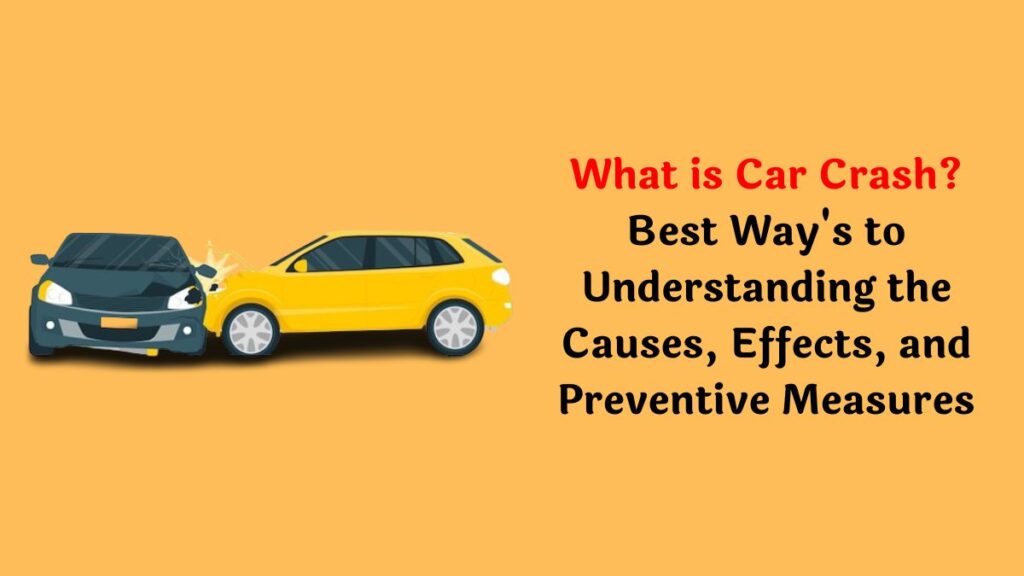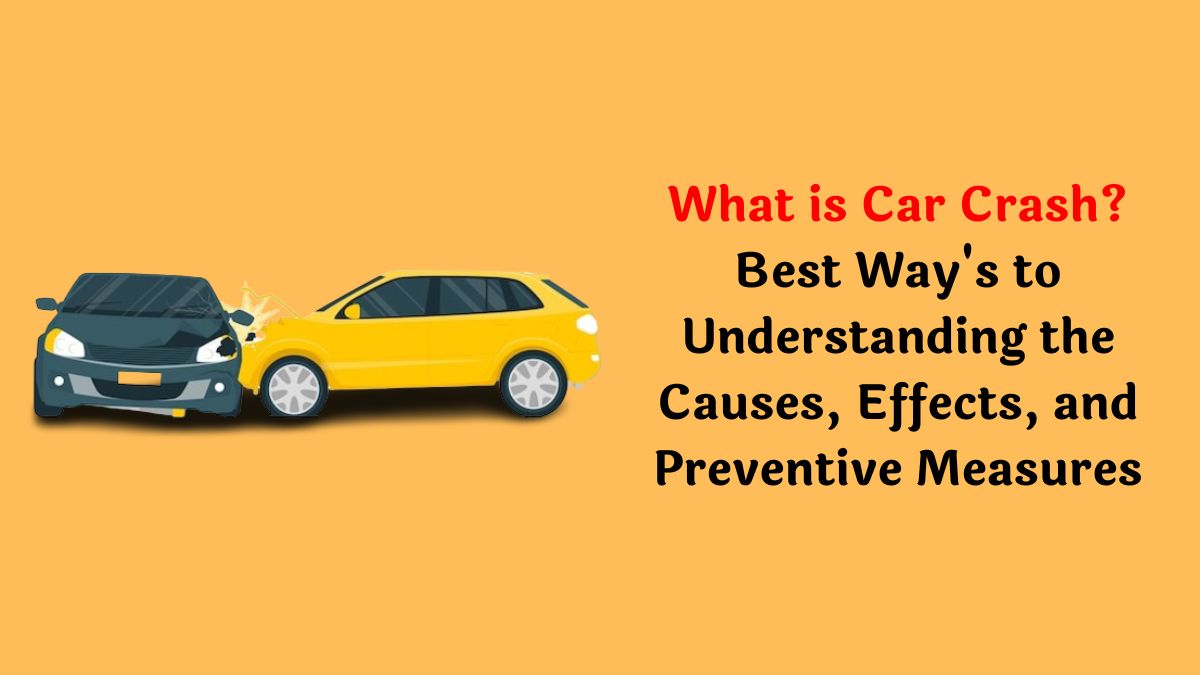Car crashes are unfortunately common occurrences on roads worldwide, often resulting in severe consequences. Understanding the causes, effects, and preventive measures associated with car crashes is crucial for promoting road safety and reducing the occurrence of such incidents.

Car Accident, also known as traffic collisions or accidents, refer to incidents involving one or more vehicles colliding with each other or stationary objects. These incidents vary in severity, ranging from minor fender-benders to catastrophic collisions resulting in fatalities.
Common Causes of Car Accident
Distracted Driving
One of the leading causes of Car Accident is distracted driving, which includes activities such as texting, talking on the phone, eating, or adjusting the radio while driving. These distractions divert the driver’s attention from the road, increasing the risk of accidents.
Speeding
Exceeding the speed limit is another significant contributor to car crashes. Driving at high speeds reduces the driver’s ability to react to sudden changes in traffic conditions, leading to collisions.
Weather conditions play a significant role in influencing the likelihood of car crashes. Adverse weather such as rain, snow, fog, or ice can create hazardous driving conditions, reducing visibility and making roads slippery.
Driving Under the Influence
Operating a vehicle under the influence of alcohol or drugs significantly impairs a driver’s judgment, coordination, and reaction time, making them more prone to causing accidents.
Weather Conditions
Adverse weather conditions such as rain, snow, fog, or ice can create hazardous driving conditions, increasing the likelihood of car crashes. Reduced visibility and slippery roads pose significant challenges for drivers.
Despite public awareness campaigns and stricter penalties for driving while intoxicated, many individuals continue to disregard the dangers and choose to get behind the wheel while impaired.
Effects of Car Accident
Physical Injuries
Car Accident often result in a range of physical injuries, including whiplash, fractures, head injuries, and internal organ damage. These injuries can vary in severity, from minor bruises to life-threatening trauma.
Psychological Impact
In addition to physical injuries, car crashes can also have a profound psychological impact on individuals involved. Post-traumatic stress disorder (PTSD), anxiety, and depression are common psychological consequences experienced by car crash survivors.
Driving under the influence of alcohol or drugs remains a persistent problem on roads worldwide. Intoxicated drivers experience impaired judgment, reduced coordination, and slower reaction times, significantly increasing the risk of accidents.
Financial Consequences
The financial implications of car crashes extend beyond vehicle repairs and medical expenses. Lost wages, legal fees, and increased insurance premiums contribute to the financial burden faced by individuals involved in accidents.
Preventive Measures for Car Crashes
Defensive Driving
Practicing defensive driving techniques, such as maintaining a safe following distance, anticipating potential hazards, and staying vigilant on the road, can help prevent car crashes.
Driving at high speeds reduces the margin for error, making it more challenging for drivers to control their vehicles and avoid collisions, especially in adverse weather or road conditions.
Avoiding Distractions
Eliminating distractions while driving, such as using mobile devices, eating, or engaging in conversations, allows drivers to focus their full attention on the road and react promptly to changing conditions.
Speeding is another prevalent factor contributing to car crashes. Despite strict speed limits and traffic regulations, many drivers choose to exceed the prescribed limits, often in a bid to save time or simply due to reckless behavior.
Obeying Traffic Laws
Adhering to speed limits, traffic signals, and road signs is essential for preventing car crashes and ensuring safe driving practices.
Regular Vehicle Maintenance
Routine maintenance checks, including brake inspections, tire rotations, and fluid top-ups, help ensure that vehicles are in optimal condition, reducing the risk of mechanical failures that could lead to accidents.
Texting, talking on the phone, checking social media, or even adjusting the GPS while driving can significantly impair a driver’s ability to react to changing traffic conditions, leading to accidents.
Legal Implications of Car Crashes
Liability
Determining liability in car crashes involves assessing factors such as negligence, reckless driving, and adherence to traffic laws. Liability may be assigned to one or more parties involved in the accident.
Insurance Claims
Filing insurance claims is a critical step in seeking compensation for damages resulting from car crashes. Understanding insurance policies and coverage limits is essential for navigating the claims process effectively.
Distracted driving stands out as one of the primary causes of car crashes in today’s digital age. With the proliferation of smartphones and other electronic devices, drivers are increasingly prone to engaging in activities that divert their attention from the road.
Legal Procedures
Legal procedures following car crashes may involve investigations, negotiations with insurance companies, and potential lawsuits to recover damages. Seeking legal guidance from experienced attorneys can help individuals protect their rights and interests.
Support Systems for Car Crash Victims
Medical Services
Accessing medical services promptly following a car crash is essential for assessing and treating injuries. Emergency responders, hospitals, and rehabilitation centers play crucial roles in providing medical care to accident victims.
Whether caused by human error, environmental factors, or mechanical failure, car crashes can result in a wide range of consequences, from minor property damage to life-altering injuries or fatalities.
Legal Aid
Seeking legal assistance from qualified attorneys specializing in personal injury law can help car crash victims navigate the legal complexities associated with seeking compensation for damages.
Emotional Support Groups
Joining support groups or counseling sessions designed for car crash survivors can provide emotional support, coping strategies, and a sense of community during the recovery process.
Car crashes are sudden, unexpected incidents that involve vehicles colliding with each other or stationary objects. They are a significant concern worldwide due to their frequency and the impact they have on individuals, families, and communities.
Must Read:-
Car Crash Related [FAQs]
Q1. What should I do immediately after a Car Accident?
Q2. How can I avoid distractions while driving?
Q3. Do Car Accident always result in legal proceedings?
Q4. Can I seek compensation for emotional distress after a car crash?
Q5. What should I do if I witness a car crash?
Conclusion
Car crashes pose significant risks to road safety, resulting in physical, psychological, and financial consequences for individuals involved. By understanding the causes of car crashes, implementing preventive measures, and accessing support systems, we can work towards reducing the incidence of accidents and promoting safer roads for all.
